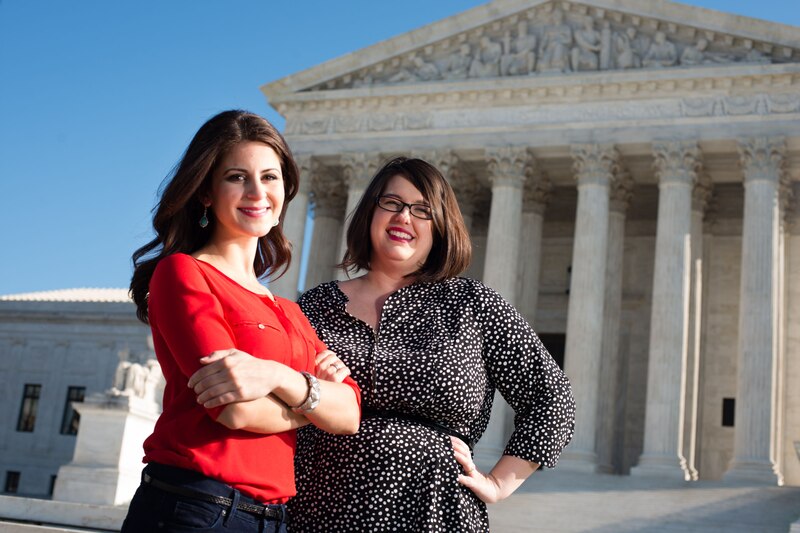This story was originally published by The 19th and is republished under a Creative Commons license. Sign up for The 19th’s newsletter here.
Aftyn Behn hoped that this would be the year the Tennessee legislature was free of bills related to the anti-abortion movement. Since it is now illegal to terminate pregnancies in the state, the Democrat figured her Republican counterparts in the Tennessee House would concentrate their efforts on causes other than restricting reproductive rights.
But she was mistaken: The House on March 18 passed the “Baby Olivia Act,” which gives public schools the greenlight to screen a fetal development video produced by a controversial anti-abortion group. A few days later, the bill made it out of the Tennessee Senate Education committee, which has recommended that the Senate pass it as well.
“I’ve been in the trenches fighting against anti-abortion legislation and policy for a long time, and I really just thought this year that they could just let it go,” Behn said. “And it just continues to get worse. They’re just trying to find little holes where they can move forward with their anti-abortion legislation, and it happens to be in curriculum that would be adopted across the state.”
Tennessee is one of several states — including North Dakota, Iowa, West Virginia, Kentucky, and Missouri — that has introduced or advanced legislation permitting public schools to screen “Meet Baby Olivia,” a three-minute computer-generated video first released in 2021 that critics call misleading and manipulative. North Dakota passed legislation allowing schools to show the video last year, but West Virginia’s “Baby Olivia” bill failed to pass before the legislative session there ended this month.
The video was created by the organization Live Action, which objects to abortion for any reason and has captured secret footage at abortion clinics while advocating for Planned Parenthood to be defunded. The organization, founded by anti-abortion activist Lila Rose, wants students nationwide to watch “Meet Baby Olivia” in school. The bills that have advanced in various states would require schools ranging from elementary to high school to show the fetal development video or one like it.
The American College of Obstetricians and Gynecologists (ACOG), which includes over 60,000 members, has raised concerns about the video, noting that it calculates gestational age two weeks earlier than standard and depicts fetal development as more advanced than it is. Critics say the video also misrepresents when a fetal heartbeat can be detected and how early one can survive outside the womb. Some conservative medical groups, meanwhile, have endorsed it.
Since most states do not require medically accurate comprehensive sex ed, exposing students to misinformation about human reproduction is concerning because youth may not have access to materials that counter it. Experts told The 19th this is especially concerning paired with widespread book bans across the country.

“‘Baby Olivia’ is a medically accurate, animated glimpse of human life in the womb,” Rose said in a statement to The 19th. “Every student in our nation deserves access to best-in-class education on human development. It is tragic that basic facts about human biology are so controversial for abortion supporters in 2024.”
She added that the video aims to educate viewers in a straightforward way. “Every fact in the video has been exhaustively sourced and corroborated and is similar to what you would find in an embryology textbook,” she said.
Mazie Stilwell, director of public affairs for Planned Parenthood Advocates of Iowa, disagrees. The Iowa House in late February passed legislation that would allow public schools to show “Baby Olivia.” Stillwell said that the video reflects the beliefs of Live Action rather than evidence-based science. “For the major medical organizations to all be firmly against this propaganda tells you everything you need to know,” Stillwell said. “This video very intentionally misleads the audience by using a dating structure that contradicts what is used in medical practice. They talked about weeks from fertilization rather than the way that pregnancy is actually calculated, which is from the last menstrual period.”
Stillwell said the video sensationalizes gestures, such as hand clasping or thumb sucking, that fetuses make. The point, she said, is to manipulate and appeal to a young audience. As “Meet Baby Olivia” has drawn widespread criticism, states including Iowa and Tennessee have amended their legislation so that schools are not required to show that video specifically but any fetal development video like it. The change in legislative wording, however, does not actually prohibit public schools from showing the Live Action video. That means schools will likely choose that video to show, as “Baby Olivia” is the most prominent fetal development video of its kind, critics say.
Behn tried unsuccessfully to amend the Tennessee legislation to bar schools from showing the Live Action video. In Iowa, legislators amended the bill to remove specific reference to “Baby Olivia,” but it still requires schools to show a computer-generated fetal development video, state Rep. Molly Buck said.
“In removing the specific reference to Live Action’s ‘Baby Olivia,’ what the bill sponsor did was put in the requirement that this computer-generated video depict the humanity of the unborn child,” Stillwell said. “Now that phrase is not defined anywhere. There’s no indication of how to measure the humanity. So, by our reading of the bill, the problem remains that the only piece of curriculum that could actually meet this prescriptive requirement from the state remains Live Action’s ‘Baby Olivia’ video.”
Such legislation, Stillwell said, constitutes an effort to put anti-choice propaganda in schools.
Educators have pushed back against “Baby Olivia” legislation, in part because they object to politicians mandating curriculum, arguing that is the domain of state boards of education or similar entities. The Iowa State Education Association has said that it opposes “the politicization of any curriculum.” Moreover, Iowa education code prohibits requiring exact instructional methodologies or materials to achieve curriculum goals.
Buck, who has taught elementary school in Iowa for 28 years, said that it is troublesome when legislators implement laws outlining exactly what must be taught in classrooms.
“Schools tend to stick to the letter of the law,” she said. “A danger of prescribing very specific curriculum in the legislature is that it starts to scare school districts about, ‘Well, can we step outside of that at all? Can we teach more than that?’”
Plus, Iowa does not require schools to offer comprehensive sex ed, so students may not learn anything about human reproduction beyond what they see in “Baby Olivia,” Buck said.
“When we talk about indoctrination of kids, we have to be mindful of both sides,” she said. “We don’t want the ‘liberal left’ indoctrinating our kids, and we don’t want the right side indoctrinating our kids either. So our kids need factual health information, not fictional.”
Heather Corinna, author of “S.E.X.: The All-You-Need-To-Know Progressive Sexuality Guide to Get You Through High School and College,” said that the silver lining may be that many young people get their information about sex through digital means, making them likely to stumble across online resources that counter any factual inaccuracies about reproduction they come across in class.
“Young people know the internet exists,” said Corinna, founder and director of Scarleteen, a sex education support organization and website. “We have millions of young people that come to Scarleteen all the time, and coming to fact check [what] they heard in sex ed is a common reason.”
Sex ed has been terrible for years, but students aren’t stupid, Corinna said. Many of them expect it to be rooted in propaganda, which Corinna considers “Baby Olivia” to be. “That’s what it is,” they said. “It’s produced like political propaganda.”
Corinna, who once worked in an abortion clinic, takes issue with how Live Action stages fetal development and describes fetuses. “They say they can recognize lullabies and stories,” they said. “No one can do a test on someone in utero to find out if they recognize something; that’s not a thing. It’s sheer projection.”
Sarah Dean, an English teacher at a public charter school in the Nashville area, objects to the video and to the fact that the sponsor of the Tennessee bill, state Rep. Gino Bulso, is a lawyer, not an educator. She pointed out that Bulso has sponsored legislation that supports censorship in schools and targets transgender students, gender-affirming care and drag performers, among other controversial policies. Bulso also sponsored the bill to expel three Democrats for protesting gun violence after a school shooting in Nashville last year. A representative for Bulso told The 19th he was not available for an interview.
Dean characterized his pattern of legislation as a systematic effort to promote a specific ideology and discriminate against individuals “who don’t fit within that,” she said.
The Baby Olivia Act, Dean continued, devalues the expertise of teaching professionals. “We don’t do that to other professionals,” she said. “But when it comes to teachers, people think, ‘Well, I went to school, so I must know.’ But there’s a lot more pedagogy that goes into teaching and being an educator, so it’s somewhat like arrogance and also just out of touch, impractical, for these people to be making bills about education because they don’t honestly know what the impact is going to be for students and for teachers.”
The goal of “Baby Olivia,” Behn said, is to emotionally manipulate young people who are or may fall pregnant into ruling out abortion. Since Tennessee has a number of health care gaps — including a lack of access to reproductive health care, high rates of parental mortality, and a large number of crisis pregnancy centers, Behn said, she considers the undertones of the video to be “nefarious.” In addition to “Baby Olivia,” Tennessee also recently introduced legislation that would make it a crime for an adult to help a minor obtain an abortion without parental consent. Given the state’s political climate, Behn is particularly concerned about youth in the state’s rural areas who may not only lack resources but also have information gaps about pregnancy and reproduction.
“The intention of this video is to show any kids who might be pregnant in the school system that the fetus is living and breathing, and that they’re better off keeping the baby,” Behn said.
But Corinna is not convinced that anti-abortion materials keep people from ending unwanted pregnancies. If they have the opportunity to do so, they typically terminate their pregnancies anyway, Corinna said, because they’re in an unhealthy romantic relationship, financially ill-equipped to raise a child, or have a medical issue, among myriad other reasons.
“More times than not, in my experience, that person, if they need an abortion, they still go have one. They just feel awful about it,” Corinna said. “What keeps people from having abortions is an inability to go get one.”







